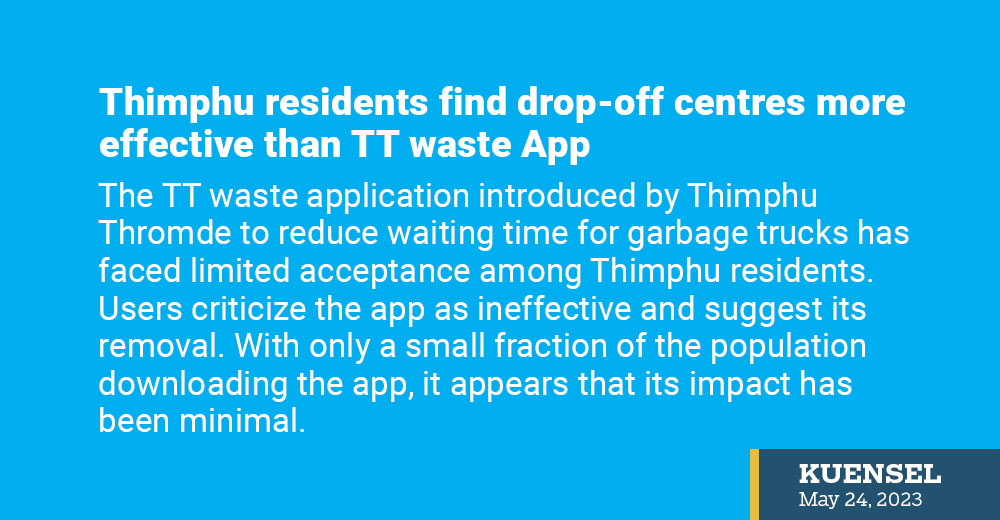Yangyel Lhaden
The TT waste application created by Thimphu Thromde has failed to acquire appeal among most Thimphu residents nearly a year after its launch. Users who have used the application say that the app is ineffective and should be removed.
The TT waste app was launched in June of last year with the intention of minimising the amount of time people waste waiting for garbage trucks. It informs consumers about waste collection schedules and delivers notifications to their phones when the waste truck arrives.
The app also provides garbage segregation advice for drop-off locations.
Only 1,170 people on Android devices and 182 people on the App Store have downloaded the software. These figures reflect only 0.011 percent of Thimphu’s total population with respect to population data of Thimphu from National Statistics Bureau in 2017.
“I am not aware of the TT waste application,” a corporate employee said. “I don’t think we need arrival notifications for waste trucks on our phones when the trucks already come with loud sirens.”
According to Sonam Tashi, proprietor of Daily Chew in Changbangdu, a considerable percentage of citizens, particularly the elderly, may be unfamiliar with the app.
He said that allowing users to register their garbage disposal needs and request a waste pickup vehicle on the app would in fact benefit the community and possibly increase usage.
Drop-off centres have proven to be more useful than the application for many Thimphu locals. Drop-off locations, according to a public servant residing in Langjophakha, are convenient since she can dispose of her trash on her way to work.
Sonam Tashi, on the other hand, emphasised that drop-off locations refuse to accept waste from commercial residents, forcing them to accumulate their rubbish until a waste truck arrives. This is a problem, particularly when it comes to keeping wet garbage, as waste collection trucks only come once a week, Sonam Tashi said.
Thromde officials said that due to limited space, drop-off stations are intended to offer homeowners with temporary storage facilities, not for waste from commercial entities. Efforts are being made, she added, to increase the frequency and efficiency of waste collection, as well as to promote waste reduction at the source and ecologically friendly products.
Users of the TT trash app have identified several difficulties. Last year, a civil servant in Changangkha tried to use the app but found out that the tracking system did not work. The real-time truck location updates were inaccurate, with the waste truck appearing in a different place on the app despite being close to her residence.
The application’s developer, Phuntsho Wangdi, acknowledged that users might not always receive messages on time due to network challenges. He said that the GPS tracking hardware used in the app periodically encounters internet network issues, which can result in outdated GPS data being uploaded to the server and messages being delivered at the incorrect time.
According to a thromde representative, efforts are being made to make the TT garbage app more useful and accessible by combining the GPS systems of the app and the National Land Commission Secretariat in order to generate with more precise waste collection information.
Some residents, such as Karchung, a 69-year-old Langjophakha resident, said he would like to learn how the app works. Karchung, who is normally at home during the day, frequently misses the waste truck, and his daughter takes the waste to drop-off centre.
Deki Choden, a Changbangdu resident, downloaded the app recently but she had trouble using it because the app just displayed her current location. Many Thimphu locals say that tutorials could help them use the app.
Phuntsho Wangdi said that despite the fact that no annual maintenance contract has been signed with the Thromde, he would continue to give updates and upgrades to the application as long as the modifications are minor. “We will also offer a lesson on how to use the application in the app’s next upgrade.”


